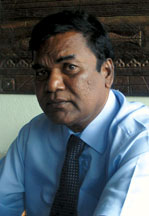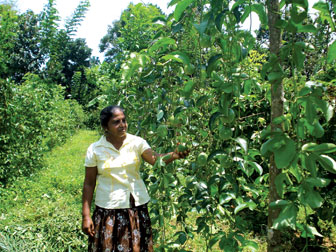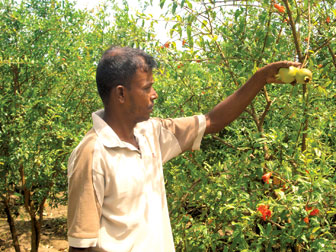Gamaneguma bears fruit in M'gala, Polonnaruwa and H'tota
by Gamini WARUSHAMANA
W.R.M. Dayawathi of Horabokka village in Wellawaya was collecting her
passion fruit harvest when we visited her farm last week. Starting with
200 plants in 2008 she now has three acres cultivated with passion fruit
from which she earns around Rs.80,000 monthly.
 |
|
Project Director GSCDLIP, Karunarathne
Pallegedera |
Traditional farming practices have been changed in these Dry Zone
villages after the Ministry of Economic Development introduced a new
livelihood development program. Passion fruit cultivation is one such
lucrative venture introduced by the Gamaneguma Second Community
Development and Livelihood Improvement Project (GSCDLIP) of the
ministry.
Passion fruit
"Passion fruit cultivation is easy compared to Chena cultivation we
did previously. We can start collecting the harvest after six months and
the plant does not need much chemical fertiliser and pesticides.
It also resists the drought and cost of production is low because
maintaining the plantation is easy. Gamaneguma introduced low cost
cultivation techniques and provided seedlings and also helps us to
market the harvest", Dayawathi said.
The heavy rain that prevailed over several months has reduced her
harvest this season. She said that she got a better harvest last year.
The price of passion fruit varies throughout the year and the highest
price, around Rs.200/ kg is received between January and April. Today
the price has dropped to Rs.50-55 kg. She said that passion fruit
cultivation is more profitable than maize or sugarcane which she
cultivated previously.
Livelihood facilitator of the GSCDLIP D.G. Vipulasiri said that over
50 families have started passion fruit cultivation in this area and the
total land extent covered is over 600 acres.
Gamaneguma wanted to introduce livelihood projects for poor people in
these villages and we found that the home based industries and
traditional crops they cultivated are not profitable enough to lift them
out of poverty.
Therefore, we introduced new crops such as passion fruit, pomegranate
and seed paddy production. These projects are highly successful, he
said.
Pomegranates
G.M. Prematilake of Veliaralanda village in Wellawaya is a model
farmer of pomegranates.
He started his cultivation in 2009 in a quarter acre of land and is
now helping the Gamaneguma program to promote the cultivation in the
district.
"Although maintaining pomegranate cultivation is somewhat difficult,
this is a very profitable business.
I collected my first harvest within six months after planting and
earned over Rs. 300,000. The second year harvest was totally lost due to
heavy rains, he said.
The farm gate price of pomegranate is Rs.280/kg and a large number of
families have now started cultivation in the Wellawaya area. Prematilake
has started a pomegranate nursery and has already sold over 12,000
plants.
Divi Neguma
Gamaneguma is also supporting the implementation of the Divi Neguma
program in nine districts where GSCDLIP is operating. The project has
targeted to launch 100,000 domestic economic units (home gardens) said
the Project Director GSCDLIP, Karunarathne Pallegedera.
 |
|
Passion fruit
cultivation in Wellawaya |
The Divi Neguma national program was launched on March 12, by
President Mahinda Rajapaksa to establish one million domestic economic
units that promote domestic agriculture to make the households
self-sufficient.
Pallegedera said that the GSCDLIP co-ordinates the implementation of
the Divi Neguma national program in addition to establishing 100,000
domestic economic units in Gamaneguma villages.
He said that GSCDLIP has experience and expertise to contribute to
this national program successfully.
Home gardens
Under Gemidiriya, phase one of our home gardening project was
successfully carried out by our beneficiaries as livelihood sub
projects.
Under the second phase of the project too communities carried home
gardening projects successfully and have increased their income.
We have already selected farmers at village level a task force has
been setup in GSCDLIP head office to launch the program, he said.
The Divineguma program aims at agriculture development at household
level and helping individual households to be self-sufficient.
Under the program, an environment will be created for the families to
fulfill their food requirements, improve nutrition and earn a stable
monthly income.
GSCDLIP has initiated the program in Badulla, Moneragala, Hambantota,
Ratnapura, Polonnaruwa, Galle, Matara, Nuwara Eliya and Kegalle
districts and uses livelihood development facilitators to implement Divi
Neguma at grass roots level.
GSCDLIP started 120 home gardens under Divi Neguma in Moneragala
district parallel to the Deyata Kirula national development exhibition
held in Buttala in February.
V.G. Premachandra in the Kukurampola village in Buttala DS division
has a highly successful home garden and in addition to domestic
consumption the harvest of his garden brings additional income to the
family.
GSCDLIP provided planting material and training. "We did not use our
home gardens properly before this program was introduced.
We were trained to manage land, select suitable crops; fruits and
vegetables and produce organic fertiliser.
Our home gardens were successful and we did not feel the high
vegetable price when they were at the peak a few months ago and also we
could earn some extra income", Premachandra said.
There is a range of successful livelihood programs implemented by
GSCDLIP in the Moneragala district. Maize cultivation in Madulla and
Siyambalanduwa DS divisions has increased the income of the community by
many folds.
Sales agreement
The farmers start cultivation on forward sales agreement with buyers
and they have the bargaining power on price because the quantity
supplied is huge and the quality of the products is guaranteed by
GSCDLIP.
Farmers have knowledge and experience in making high quality maize
with the five-year experience they have had with GSCDLIP.
Gamaneguma Peoples' Companies of the village co-ordinate the whole
supply chain ensuring a fair price to the farmers.
In Maha season 2010 Rs.50 million was disbursed for maize cultivation
by GSCDLIP. GSCDLIP also provides high yield seeds and technology to the
farmers.
Amara Damayanthi in the Magandana village in Madulla DS division
earns a good income by papaya cultivation.
She has also started pomegranate cultivation and a home garden under
the Divi Neguma program.
W.M. Karunawathi of Vilaoya in Siyambalanduwa DS division has started
banana cultivation in the land she cultivated maize during the last Maha
season. GSCDLIP has provided Rs.15,000 credit and saplings.
W.M. Thilakarathne in the same village has started ginger
cultivation.
All these farmers have radically changed the farming practices they
used over the ages.
 |
|
Pomegranates
cultivation a lucrative venture |
They have confidence in the new ventures because they get technical
know-how, credit and an assured market.
The influence of one successful project in a village is massive and
people tend to follow it.
As a result, farmers who start first have the advantage of earning an
additional income by providing seedlings.
Seed paddy farming is also a successful project that has doubled the
income of the paddy farmers in Gamaneguma villages.
Polonnaruwa, Hambantota districts
Piyasena Ranasinghe of Suriya Wewa is the chairman of the Seed Paddy
Farmers' Association in Suriyawewa.
This Yala season he cultivated 3.5 acres of seed paddy.
According to Pallegedera, the demand for seed paddy has sharply
increased after resumption of agriculture in the North and the East and
as a result the price of seed paddy has increased.
Some big agro companies are exploiting the opportunity and as a
result the farmers suffer.
"The objectives of our intervention into producing seed paddy are to
increase the income of the farmers in Gamaneguma villages as well as
provide high quality seed paddy at an affordable price to the farmers",
he said.
According to Ranasinghe, due to special care the farmers take in seed
paddy farming, the harvest has increased sharply and the income and
profit has doubled.
The price of seed paddy is double that of normal paddy. Seed paddy
produced by Gamaneguma villages is marketed by GSCDLIP with
certification of the Department of Agriculture.
In the last Maha season Sooriyawewa farmers sold 6,000 bushels of
seed paddy to the Northern Province farmers.
|

